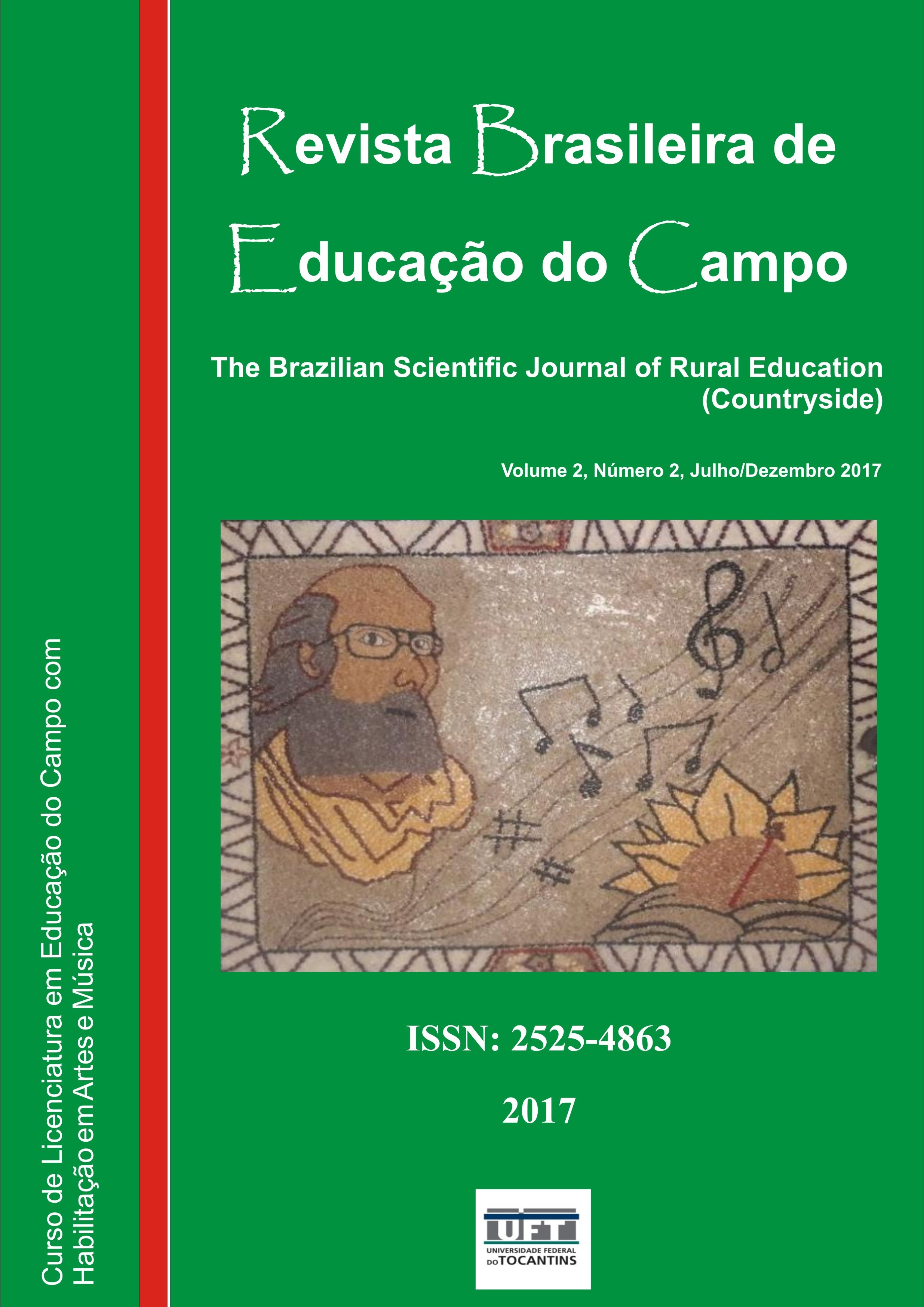Peasant Education: Mishaps in the construction of the undergraduate course in peasant education at the Regional University of Cariri
DOI:
https://doi.org/10.20873/uft.2525-4863.2017v2n2p472Abstract
ABSTRACT. This is a collective work for requiring all of us the effort to reflect on our practice. In it, we report and think about the difficulties in the construction and during the course of graduation in peasant education of the Regional University of Cariri (LEDOC/URCA). We intend to contribute to the implementation of other teacher training courses such as this one, based on the contextualized peasant education and alternation as a basis for building a new sociability, adopting liberating education as proposed by Freire (2007) and the Landless Movement. From the initial diagnosis, made by the teachers and students of the course, the main difficulty faced was the alternation, so we understand the need to reflect about pedagogical practices because we are not used to look at the socio-political context and, from it dealing with the challenges we found. The accomplishment of this case study required the reading of the documents that regulate the operation of the course; Reports on meetings, seminars and teaching practices; We dialogued with the research findings underway led by the LEDOC / URCA coordination. We point out that this experience is an enriching starting point in the search for institutionalization of LEDOC as a regular course.
Downloads
Literaturhinweise
Antunes-Rocha, M. I., & Martins, M. F. A. (2012). Tempo Escola e Tempo Comunidade. In Antunes-Rocha, M. I., Martins, M. F. A., & Martins, A. A. (Orgs). Territórios educativos na educação do campo: escola, comunidade e movimentos sociais. Belo Horizonte-MG: Autêntica Editora.
Arroyo, M. G. (2011). Educação Básica e o Movimento Social do Campo. In Arroyo, M. G., Caldart, R. S., & Molina, M. C. (Orgs.). Por uma educação do campo (pp. 67-86). Petrópolis - RJ: Editora Vozes.
Caldart, R. S. (2004). Pedagogia do Movimento Sem Terra. São Paulo-SP: Expressão Popular.
Fernandes, B. M., Cerioli, P. R., & Caldart, R. S. (2011). Primeira Conferência Nacional “Por uma Educação Básica do Campo”. In Arroyo, M. G., Caldart, R. S., & Molina, M. C. (Orgs.) Por uma educação do campo (pp. 19-63). Petrópolis-RJ: Editora Vozes.
Fernandes, B. M. (2008). Por uma educação do campo. Brasília-DF: INCRA/MDA.
Freire, P. (1979). Educação e mudança. Rio de Janeiro-RJ: Paz e Terra.
Freire, P. (2015). Pedagogia da esperança: um reencontro com a pedagogia do oprimido. São Paulo-SP: Paz e Terra.
Freire, P. (2007). Pedagogia do oprimido. São Paulo-SP: Paz e Terra.
Ianni, O. (2009). A Utopia Camponesa. In Welch, C. A., Malagodi, E., Cavalcanti, J. S. B., & Wanderley, M. N. B. (Org.) Camponeses brasileiros: leituras e interpretações clássicas (pp. 135-144). São Paulo-SP: Editora Unesp.
Jesus, J. G. (2011). Formação dos professores na pedagogia da alternância: saberes e fazeres do Campo. Vitória-ES: GM Editora.
Kosik, K. Dialética do concreto. Rio de Janeiro: Paz e Terra, 2010.
Liguori, G. (2003). Estado e sociedade civil: entender Gramsci para entender a realidade. In Coutinho, C. N., & Teixeira, A. P. (Orgs.). Ler Gramsci, entender a realidade (pp. 173-188). Rio de Janeiro-RJ: Civilização Brasileira.
Marx, K. (2003). O Capital: crítica da economia política. Rio de Janeiro-RJ: Editora Civilização Brasileira.
Molina, M. C., & Sá, L. M. (2012). Licenciatura em Educação do Campo. In Caldart, R. (Org.). Dicionário da Educação do Campo. Rio de Janeiro-RJ: Escola Politécnica de Saúde Joaquim Venâncio, Expressão Popular.
Morin, E. (2013). A via para o futuro da humanidade. Rio de Janeiro-RJ: Editora Bertrand Brasil.
MST/Setor de Educação. (2002). Por uma educação básica do campo. In Kolling, E. J., Nery, I. I. J., & Molina, M. C. (Orgs.). Brasília-DF: Fundação Universidade de Brasília.
Resolução nº 2, de 28 de abril de 2008. (2008, 28 de abril). Estabelece diretrizes complementares, normas e princípios para o desenvolvimento de políticas públicas de atendimento da Educação Básica do Campo. Recuperado de http://portal.mec.gov.br/arquivos/pdf/resolucao_2.pdf
SECADI/MEC. (2007). Educação do Campo: diferenças mudando paradigmas. Brasília-DF: Ministério da Educação. (Cadernos SECADI 3).
SECADI/MEC. (2012). Educação do Campo: marcos normativos. Brasília-DF. MEC. Recuperado de: http://pronacampo.mec.gov.br/images/pdf/bib_educ_campo.pdf
SEDUCRATO. (2016). Relatório Operacional da Secretaria de Educação do Crato. Crato-CE. Arquivo da LEDOC/URCA.
URCA. (2007). Ata da 5ª reunião do Grupo de Trabalho responsável pela elaboração do Plano Político Pedagógico do Curso de Licenciatura em Educação do Campo. Crato-CE. Arquivo da LEDOC/URCA.
Movimentos Sociais. (2010). (Trabalho de Conclusão de Curso de Graduação). Universidade Federal do Pará, Abaetetuba.
Projeto Político Pedagógico. (2008). Curso de Licenciatura em Educação do Campo. Cariri: Universidade Regional do Cariri.
Soares, M. (2002). Linguagem e escola: uma perspectiva social. São Paulo: Ática.
Silva, R. V. M. (2004). O português são dois: novas fronteiras, velhos problemas. São Paulo: Parábola Editorial.
Teixeira, E. (1998). Políticas públicas no município: dificuldades e possibilidades da municipalização. CONTAG.
Veröffentlicht
Zitationsvorschlag
Ausgabe
Rubrik
Lizenz
Creative Commons Attribution License
Creative Commons Attribution License
Proposal for Copyright Notice Creative Commons
1. Policy Proposal to Open Access Journals
Authors who publish with this journal agree to the following terms:
A. Authors retain copyright and grant the journal right of first publication with the work simultaneously licensed under the Creative Commons Attribution License that allows sharing the work with recognition of its initial publication in this journal.
B. Authors are able to take on additional contracts separately, non-exclusive distribution of the version of the paper published in this journal (ex .: publish in institutional repository or as a book), with an acknowledgment of its initial publication in this journal.
C. Authors are permitted and encouraged to post their work online (eg .: in institutional repositories or on their website) at any point before or during the editorial process, as it can lead to productive exchanges, as well as increase the impact and the citation of published work (See the Effect of Open Access).














